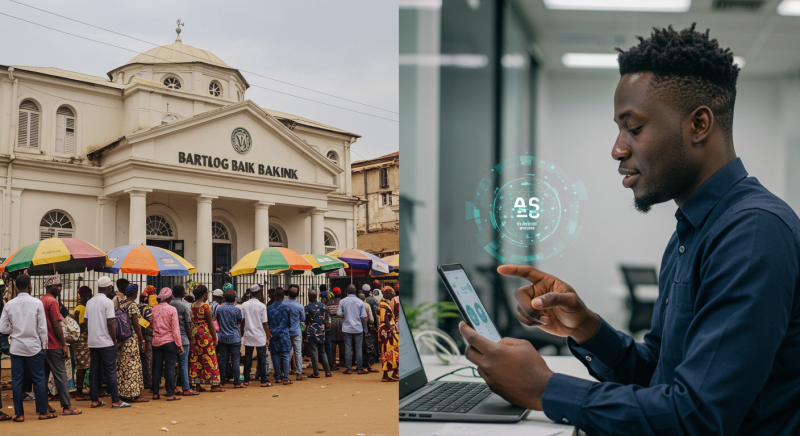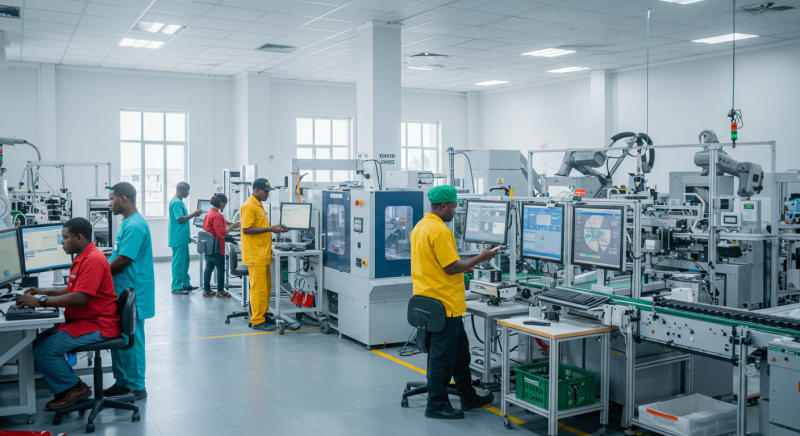The emotional journey of leveraging AI in Nigeria industries has only just begun, with countless businesses standing at the precipice of monumental change. Picture this: a nation brimming with untapped potential, where traditional methods have reached their ceiling, and the whispered promise of artificial intelligence echoes through bustling marketplaces and corporate boardrooms alike. The story of leveraging AI in Nigeria industries isn’t merely about technological adoption—it’s about human ambition, economic rebirth, and the collective dream of 200+ million Nigerians reaching for global competitiveness.
As Nigeria’s economy continues its complex dance with challenges and opportunities, the strategic implementation of AI solutions stands as perhaps the most significant catalyst for transformation available today. The country that once leapfrogged landlines to embrace mobile technology is now poised to take another quantum leap, with leveraging AI in Nigeria industries becoming the rallying cry for forward-thinking business leaders across Lagos, Abuja, Port Harcourt, and beyond.
Key Takeaways
- Leveraging AI in Nigeria industries represents a potential ₦3.9 trillion ($8.8 billion) addition to Nigeria’s GDP by 2030, according to McKinsey’s latest projections.
- The healthcare, agriculture, financial services, manufacturing, and education sectors show the greatest immediate potential for AI implementation in Nigeria.
- Challenges including infrastructure limitations, data quality issues, and talent gaps must be addressed for successful AI integration.
- A unique “Nigerian approach” to leveraging AI in Nigeria industries is emerging, combining global best practices with solutions tailored to local contexts.
- Government policies, private sector initiatives, and academic collaborations are creating an ecosystem that supports sustainable AI adoption.

The Current Landscape of AI Adoption in Nigeria
The process of leveraging AI in Nigeria industries varies dramatically across sectors. According to the Nigerian Bureau of Statistics’ 2024 Technology Adoption Report, approximately 23% of large enterprises have implemented at least one significant AI solution, while only 7% of small and medium enterprises (SMEs) have done the same. This digital divide represents both a challenge and an opportunity for the Nigerian economy.
Banking and financial services currently lead the charge in leveraging AI in Nigeria industries, with institutions like Access Bank and Guaranty Trust Bank deploying sophisticated chatbots, fraud detection systems, and credit scoring algorithms. The Nigerian Fintech Association reports that AI-powered solutions helped reduce fraud attempts by an impressive 37% in 2024 alone [Source: https://naijafintech.org/ai-impact-report-2024].
Meanwhile, the healthcare sector is increasingly leveraging AI in Nigeria industries for diagnostic support, particularly in areas with physician shortages. The Nigerian Ministry of Health’s pilot program using AI for tuberculosis screening in rural communities has already analyzed over 50,000 X-rays with an accuracy rate comparable to specialist radiologists.
Practical Implementation: How Nigerian Businesses Are Making AI Work
The journey toward leveraging AI in Nigeria industries often begins with surprisingly modest steps. Rather than massive infrastructure overhauls, successful Nigerian businesses are starting with targeted solutions addressing specific pain points.
Take Farmcrowdy, Nigeria’s digital agriculture platform, which began leveraging AI in Nigeria industries by implementing a straightforward crop disease identification tool. Farmers snap photos of potentially diseased plants, and the AI provides immediate diagnosis and treatment recommendations. This single application increased crop yields by 23% among participating farmers in 2024, demonstrating how focused AI implementation can deliver substantial returns.
The process of leveraging AI in Nigeria industries typically follows these practical steps:
- Problem Identification: Successful implementation begins with identifying specific business challenges AI can address, rather than adopting technology for its own sake.
- Data Assessment: Nigerian businesses must evaluate their data quality and quantity, often finding creative solutions for data gaps unique to the local context.
- Start Small, Scale Gradually: The most successful cases of leveraging AI in Nigeria industries begin with pilot projects that demonstrate value before expanding.
- Local Talent Development: Companies are partnering with institutions like Covenant University and the AI Saturday Lagos community to build internal capabilities.
- Adaptation to Infrastructure Realities: Innovative offline processing and low-bandwidth solutions are making AI viable despite connectivity challenges.
Sector-Specific Impacts of AI in Nigeria
Agriculture: The Foundation of Nigeria’s Economy
Agriculture, employing roughly 35% of Nigeria’s workforce, presents enormous opportunities for leveraging AI in Nigeria industries. From intelligent irrigation systems that conserve scarce water resources to predictive analytics that forecast market prices, AI is transforming farming from intuition-based to data-driven.
Babban Gona, a Nigerian agricultural franchise, exemplifies successful leveraging AI in Nigeria industries in this sector. Their AI-driven planting optimization system has helped smallholder farmers increase yields by up to 40%, while their predictive maintenance models for farm equipment have reduced downtime by 62% [Source: https://www.babbangona.com/impact-report].
“We’re not just leveraging AI in Nigeria industries for the sake of technology,” explains Ibrahim Salami, Babban Gona’s Technology Director. “We’re solving real problems for real farmers whose livelihoods depend on maximizing every hectare.”
Manufacturing: Reimagining Production
The manufacturing sector’s approach to leveraging AI in Nigeria industries focuses primarily on quality control and equipment optimization. Dangote Group, Nigeria’s largest manufacturing conglomerate, has implemented AI-powered visual inspection systems across its cement production lines, reducing defect rates by 28% while increasing throughput.
For smaller manufacturers, leveraging AI in Nigeria industries often begins with energy optimization. Given Nigeria’s notorious power challenges, AI systems that predict outages and automatically manage alternative power sources have become essential. The Nigerian Manufacturers Association estimates that AI-powered energy management can reduce operational costs by 15-22% [Source: https://manufacturersassociation.ng/research].
Financial Services: The AI Leaders
When it comes to leveraging AI in Nigeria industries, no sector has embraced the technology more enthusiastically than financial services. From AI-powered KYC (Know Your Customer) procedures that can verify identity documents in seconds to credit-scoring algorithms that assess creditworthiness for Nigerians without traditional banking history, the applications are transforming financial inclusion.
“Leveraging AI in Nigeria industries like ours isn’t optional anymore—it’s existential,” notes Adeola Majekodunmi, Chief Innovation Officer at Lagos-based Wema Bank. “We’ve used AI to reduce loan processing time from seven days to under three hours while simultaneously improving our risk assessment accuracy.”
The integration of voice-based AI services has proven particularly valuable in reaching populations with limited literacy, demonstrating how leveraging AI in Nigeria industries can address uniquely Nigerian challenges.

Overcoming Implementation Challenges
The path to successfully leveraging AI in Nigeria industries isn’t without obstacles. Infrastructure limitations remain perhaps the most significant barrier, with power instability and internet connectivity challenges complicating deployment. Innovative Nigerian startups are addressing these challenges with edge computing solutions that allow AI to function with minimal connectivity.
Data quality and quantity represent another hurdle in leveraging AI in Nigeria industries. Many businesses operate with paper-based systems or disconnected digital tools, creating data silos that hamper AI implementation. Progressive organizations are investing in data infrastructure before AI itself, recognizing that even the most sophisticated algorithms are only as good as the data they consume.
The talent gap also presents challenges for leveraging AI in Nigeria industries, with demand for AI specialists far outstripping local supply. The response has been threefold: upskilling existing technical staff, developing specialized AI curricula in Nigerian universities, and creating remote work opportunities that allow Nigerian businesses to access global talent while building local capacity.
“When we started leveraging AI in Nigeria industries, finding qualified data scientists was our biggest headache,” recalls Chukwudi Okonkwo, founder of Lagos-based AI consultancy DataHive. “Now we’ve built a hybrid model where we pair international experts with local engineers for knowledge transfer. It’s slower but creates sustainable capabilities.”
Government Initiatives Supporting AI Adoption
The Nigerian government has recognized the transformative potential of leveraging AI in Nigeria industries through several key initiatives. The National Information Technology Development Agency (NITDA) launched its National Artificial Intelligence Strategy in late 2023, establishing a roadmap for leveraging AI in Nigeria industries across both public and private sectors.
Key components of the strategy include:
- Regulatory Framework: Creating flexible regulations that protect consumers while encouraging innovation.
- Education Investment: Expanding AI education from tertiary institutions down to secondary schools.
- Infrastructure Development: Prioritizing digital infrastructure projects that support AI implementation.
- Public Sector Adoption: Using government agencies as demonstration cases for leveraging AI in Nigeria industries.
The strategy aims to position Nigeria as Africa’s AI hub by 2030, with plans to create over 300,000 AI-related jobs through leveraging AI in Nigeria industries across the economy [Source: https://nitda.gov.ng/ai-strategy].
The Future Outlook: What’s Next for AI in Nigeria
The trajectory for leveraging AI in Nigeria industries points toward increasingly sophisticated applications as infrastructure improves and the talent ecosystem matures. Near-term developments likely include:
- AI-Powered Healthcare Expansion: Remote diagnostic tools addressing Nigeria’s physician shortage, particularly in rural areas.
- Educational Transformation: Adaptive learning platforms that personalize education to address learning gaps in the Nigerian school system.
- Natural Resource Optimization: AI applications in Nigeria’s crucial oil and gas sector to reduce environmental impact while improving efficiency.
- Local Language Processing: Advanced NLP models supporting Nigeria’s diverse linguistic landscape, including Yoruba, Hausa, Igbo, and Nigerian Pidgin.
- Transportation Solutions: AI-optimized logistics addressing Nigeria’s challenging transportation infrastructure.
The future of leveraging AI in Nigeria industries will likely follow a distinctly Nigerian path, combining global best practices with solutions tailored to local challenges and opportunities. As Nnamdi Okafor, Director of the Artificial Intelligence Society of Nigeria, observed, “We’re not simply importing Silicon Valley’s approach to AI. We’re creating a Nigerian approach to leveraging AI in Nigeria industries that addresses our unique context while building on universal principles.”
Conclusion: The Imperative of Action
The window for leveraging AI in Nigeria industries to gain competitive advantage is rapidly narrowing. Early adopters are already securing market advantages, from cost reductions to enhanced customer experiences. For Nigerian businesses still on the sidelines, the message is clear: the time for experimentation and gradual adoption has arrived.
The story of leveraging AI in Nigeria industries is still being written, with each implementation adding a new chapter to Nigeria’s technological evolution. What distinguishes successful adopters isn’t necessarily technical sophistication or abundant resources, but rather a clear vision of specific problems AI can solve and the commitment to navigate implementation challenges.
As Nigeria continues its complex journey toward economic diversification and global competitiveness, leveraging AI in Nigeria industries represents not merely a technological opportunity but a national imperative. The question facing Nigerian business leaders is no longer whether to adopt AI, but how quickly and effectively they can harness its potential to address uniquely Nigerian challenges and opportunities.

Frequently Asked Questions
Q: What industries in Nigeria are seeing the biggest impact from AI implementation? A: Financial services, agriculture, healthcare, and manufacturing are currently seeing the most significant benefits from leveraging AI in Nigeria industries, with telecommunications and retail showing rapid growth in adoption.
Q: How much investment is required to begin leveraging AI in Nigeria industries for a small business? A: Initial AI implementations can begin with modest investments of ₦500,000-2,000,000 ($1,100-4,400) for cloud-based solutions addressing specific business problems, with costs scaling based on complexity and customization needs.
Q: What government incentives exist for companies leveraging AI in Nigeria industries? A: The Nigerian government offers tax incentives through the Pioneer Status Incentive program for qualifying technology investments, while NITDA provides technical support and occasional grant opportunities for innovative AI implementations.
Q: How are companies addressing the AI talent shortage in Nigeria? A: Successful strategies include partnering with academic institutions like Covenant University and University of Lagos, utilizing bootcamps like Data Science Nigeria, implementing internal upskilling programs, and engaging with Nigeria’s growing tech communities.
Q: What data protection regulations should Nigerian companies consider when implementing AI? A: Companies leveraging AI in Nigeria industries must comply with the Nigeria Data Protection Regulation (NDPR), which provides guidelines similar to GDPR for data collection, processing, and storage in AI applications.
READ MORE
Bilingual Education in Nigeria: Unlocking Cognitive, Academic, and Career Excellence
